When composer and lyricist David Yazbek first came upon the true story of Elmer McCurdy (1880-1911) some 30 years ago, he was haunted by it. The corpse of the turn-of-the-century, mostly failed bank and train robber from Oklahoma, shot dead by a Western posse, had been turned into a mummified sideshow attraction that travelled the US for decades. In 1976, the desiccated remains, by then painted phosphorescent red, were hanging in a house of horrors at an amusement park in Long Beach, California. During the filming of an episode of The Six Million Dollar Man TV series there, a crew member with the show, thinking it was a prop dummy, knocked off an arm, revealing a human bone inside and triggering an autopsy, the search into whose body it was, and how it got there. Yazbek told friend and bandmate Erik Della Penna the intriguing story, they began writing a song cycle on the subject, then invited playwright Itamar Moses and director David Cromer, Yazbek’s Tony-winning collaborators from The Band’s Visit, to hop on board to create a new stage musical. The result is the world premiere of the brilliantly original, wildly entertaining, and aptly admonitory Dead Outlaw, now playing a limited Off-Broadway engagement at Audible’s Minetta Lane Theatre, and Audible’s first-ever musical.
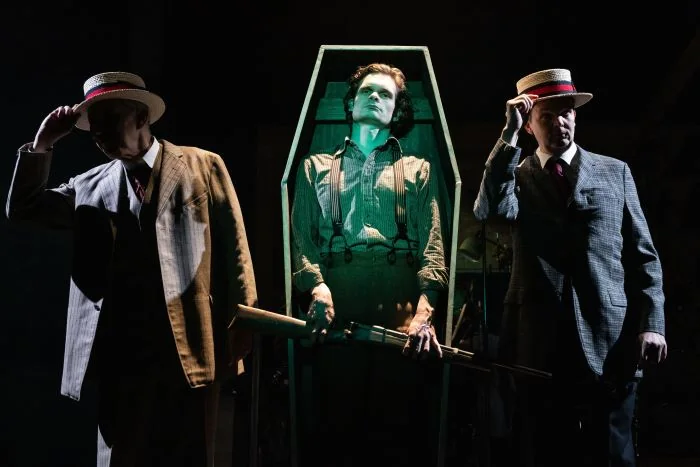
The stranger-than-fiction story is told through a seamless combination of direct-address narration, emotionally expressive songs, and non-linear re-enactments of the key points in the outlaw’s journey, presented in two parts (“The Life of Elmer McCurdy” and “The Death of Elmer McCurdy”), framed by a prologue that introduces us to the titular figure just prior to his death and establishes the underlying didactic message with the aggressive number “Dead,” and an epilogue of his 1977 funeral procession and burial, with a final full-company reprise of the recurrent song and its pointed universal theme of human mortality, which comes to all of us, whether fortunate or unfortunate, law-abiding or rebellious, famous or forgotten.
A blockbuster cast of eight (Jeb Brown, Eddie Cooper, Dashiell Eaves, Julia Knitel, Ken Marks, Trent Saunders, and Thom Sesma, each appearing in multiple roles, and Andrew Durand as McCurdy, both dead and alive) and a powerhouse five-piece band (conductor Rebekah Bruce on piano and vocals, Spencer Cohen on drums, Hank on guitars and vocals, Chris Smylie on bass, and Della Penna on guitars, lap steel, banjo, and vocals) deliver it with full-blown mastery and full-out commitment, with not a single weak link among them, as they transition fluidly from scene to scene, character to character, gallows humor to tragic pathos, sensitive ballad to psychobilly and country-western to Vegas lounge-act musical stylings.
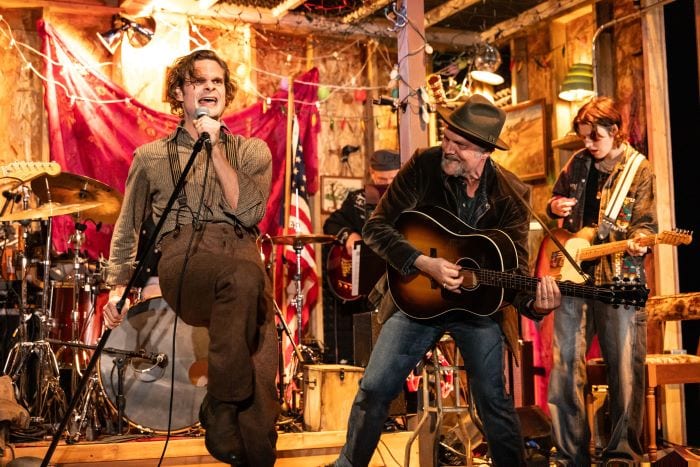
Durand turns in a phenomenal performance as McCurdy, embodying his troubled childhood, uncontrolled anger and alcoholism, outsider status, and unfulfilled ambition to do something memorable (even if illegal) or to go down as “The Bandit Who Wouldn’t Give Up,” as he was advertised in his grotesque postmortem commercialization by greedy entrepreneurs. It’s a portrayal that, despite his bad decisions and explosive temper – which reaches a ferocious peak in “Killed a Man in Maine” (he probably didn’t), as he smashes the stage in a drunken rage – elicits our sympathy for this poor lost soul and victim of the heartless exploitation that brought him “15 minutes of fame” in his afterlife, before being forgotten again until his rediscovery in 1976, and his immortalization in this remarkable production. He also makes us wonder if it’s a motionless Durand himself in the coffin-like box displaying his corpse, or a mannequin, puppet, or wax figure – just as the crew was confused in the California TV shoot – in an amazing feat of trompe l’oeil staging.
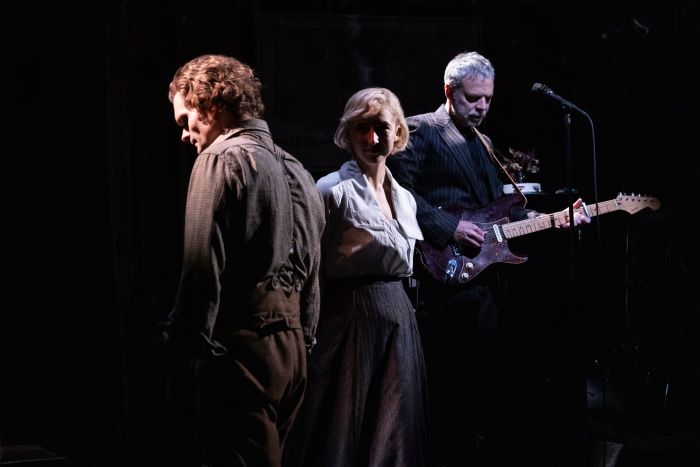
Other knockout vocals are delivered by Knitel (“A Stranger”), Saunders (“Andy Payne”), and Sesma “Up to the Stars”), and by the ensemble (“Somethin Bout a Mummy”), bringing to life the different moods and array of musical genres, and adding sensitivity, energy, humor, and derision to the show, under the music direction of Bruce, with orchestrations by Della Penna, Yazbek, and music supervisor Dean Sharenow, and movement direction by Ani Taj.
The stellar performances take place on an efficient set by Arnulfo Maldonado that evokes a tumbledown Western shack, with a rotating platform on which the band, its instruments, floor mics, and the featured singers appear, constructed of raw-wood wall studs and a leaning ladder up to a side loft. A movable kitchen table and chairs, the all-important dissecting table with McCurdy’s corpse, and the cement chute that seals his burial plot are rolled in at stage left and right for the different enacted scenes, without detracting from the central focus on the musical storytelling. Cromer keeps the transitions flowing, without missing a beat.
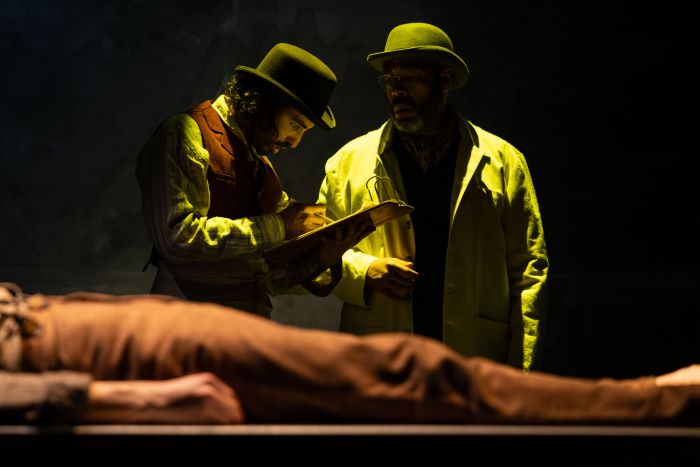
Period-style costumes by Sarah Laux define the characters and decades, props by Faye Armon-Troncoso include the guns and safes used in McCurdy’s bungled robbery attempts, with the sound of the trains and gunfire provided by Kai Harada and Joshua Millican, and a soundscape by Isabella Curry, which transport us to the Old West. And Heather Gilbert’s lighting contributes invaluably to the show’s dark, sinister, creepy themes and moods and to the bright and lively segments with the band and its illuminating message.
If you can’t see the consummately crafted and profoundly resonant Dead Outlaw live in person at Minetta Lane – and you should try your very best to get there – an audio version of the musical will also be recorded and released on Audible at a later date TBA. Either way, be sure not to miss this extraordinary work, for which I’ve run out of superlatives.
Running Time: Approximately one hour and 40 minutes, without intermission.
Dead Outlaw plays through Sunday, April 14, 2024, at Audible’s Minetta Lane Theatre, 18 Minetta Lane, NYC. For tickets (priced at $87-126, including fees), go online.


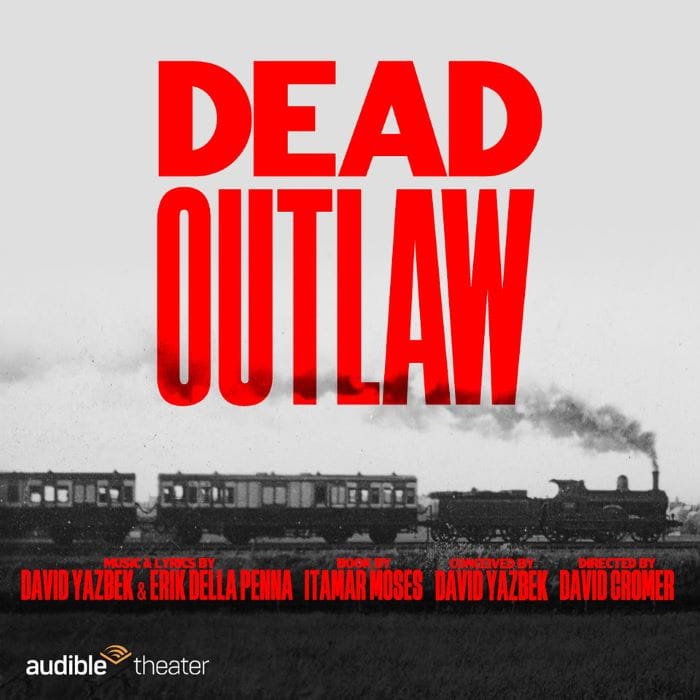
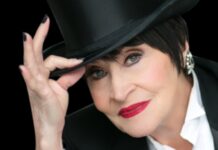

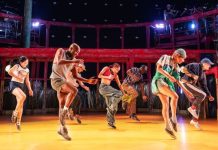
Audible has just announced a one-week extension of the critically acclaimed audience favorite Dead Outlaw, now playing through Sunday, April 14.